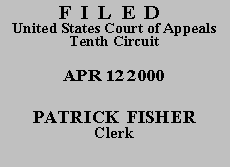
| THOMAS E. SCHERER,
Plaintiff-Appellant, v. G.E. CAPITAL CORPORATION, doing business as Monogram Retailer Credit Services, Inc., Defendant-Appellee. |
|
Plaintiff pro se Thomas E. Scherer appeals the district court's dismissal of his employment discrimination case on summary judgment. Plaintiff filed this action against defendant his former employer under the Americans with Disabilities Act (ADA), 42 U.S.C. §§ 12101-12213, and Title VII of the Civil Rights Act of 1964, 42 U.S.C. §§ 2000e to 2000e-17, alleging that defendant discriminated against him by discharging him and failing to reasonably accommodate his disability (bipolar and obsessive compulsive disorders). Plaintiff also alleged discrimination on the basis of his gender. We have jurisdiction under 28 U.S.C. § 1291, and affirm.
We review a grant of summary judgment de novo and apply the same standard as applied by the district court. See Sorenson v. University of Utah Hosp., 194 F.3d 1084, 1086 (10th Cir. 1999). Summary judgment is appropriate "if the pleadings, depositions, answers to interrogatories, and admissions on file, together with the affidavits, if any, show that there is no genuine issue as to any material fact and that the moving party is entitled to a judgment as a matter of law." Fed. R. Civ. P. 56(c). As required, "we view the factual record and inferences therefrom in the light most favorable to the nonmoving party." Bullington v. United Air Lines, Inc., 186 F.3d 1301, 1313 (10th Cir. 1999).
Once the moving party meets its "initial burden to show that there is an absence of evidence to support the nonmoving party's case," Thomas v. IBM, 48 F.3d 478, 484 (10th Cir. 1995) (quotation omitted), it is the nonmoving party's burden to "identify specific facts that show the existence of a genuine issue of material fact." Id. "The party opposing the motion must present sufficient evidence in specific, factual form for a jury to return a verdict in that party's favor." Id. (quotation omitted).
On appeal, plaintiff contests the district court's findings that he was not a disabled individual under the ADA and that he did not request reasonable accommodation and make his limitations known to defendant. Plaintiff also contests the district court's application of Murphy v. United Parcel Service, Inc., 119 S. Ct. 2133, 2137 (1999). Plaintiff does not challenge the district court's dismissal of his reverse gender discrimination claim.(1)
We have reviewed the parties' submissions, the record, the sealed documents,(2) the relevant law, and the district court's decision. We have nothing further to add to the district court's thorough, well-reasoned decision. Therefore, we affirm the district court for substantially the same reasons stated in that court's Memorandum and Order dated July 1, 1999.
We hereby AFFIRM the judgment of the district court, GRANT plaintiff's motion to submit documents under seal, DENY plaintiff's motion to reconsider the stay, and DENY all other outstanding motions.
Entered for the Court
Circuit Judge
*. This order and judgment is not binding precedent, except under the doctrines of law of the case, res judicata, and collateral estoppel. The court generally disfavors the citation of orders and judgments; nevertheless, an order and judgment may be cited under the terms and conditions of 10th Cir. R. 36.3.
1. Although in his opening brief, plaintiff claimed the district erred in dismissing his gender discrimination claim, he subsequently dropped the issue in his reply brief. See "Appellant Response to the Appellee Brief" at 4, ¶ 4.
2. Plaintiff submitted documents under seal from the Social Security Administration and the Veterans Administration. We have reviewed these documents and conclude that they do not affect the disposition of plaintiff's appeal.